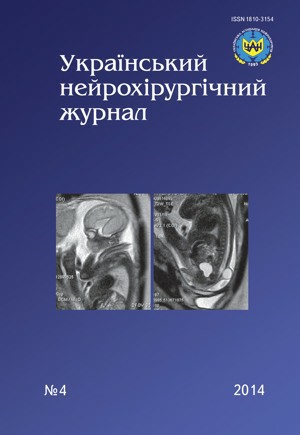Study of mesenchymal stem cells of adipose tissue effect on the growth of experimental glioma of the rats’ brain
DOI:
https://doi.org/10.25305/unj.46594Keywords:
glioma 101.8, mesenchymal stromal cells of adipose tissue, cultivation, experimentAbstract
Introduction. Relevant issue is the study of mesenchymal stem cells (MSC) effect on growth of tumors with different structures, including brain tumors.
Materials and methods. The study was carried out on white rats. Stromal fraction of adult rats adipose tissue (AT) was prepared and cultured and subsequently administered to animals with glioma (strain 101.8).
Results. Culturing cells of AT stromal-vascular adhesive fraction on day 10–12 we observed formation of fibroblast-like cells with MSC phenotype. Triple intraperitoneal injection of AT MSC on day 3, 5 and 8 after experimental glioma cell implantation did not significantly influenced animals longevity. At intracerebral implantation of tumor cells and AT MSC in a ratio 4:1 duration of disease clinical manifestations and illness in rats with glioma increased, that was accompanied by a tendency to mitotic activity reduce in tumor cells in areas between foci of necrosis.
Conclusions. Intracerebral implantation of tumor cells and AT MSC causes prolong disease clinical manifestations and illness in rats with glioma.
References
Correction: Targeting Rat Brainstem Glioma Using Human Neural Stem Cells and Human Mesenchymal Stem Cells. Clinical Cancer Research. 2010;16(21):5367-5367. CrossRef
Birnbaum T, Roider J, Schankin C et al. Malignant gliomas actively recruit bone marrow stromal cells by secreting angiogenic cytokines. Journal of Neuro-Oncology. 2007;83(3):241-247. CrossRef
Lazennec G, Jorgensen C. Concise Review: Adult Multipotent Stromal Cells and Cancer: Risk or Benefit?. Stem Cells. 2008;26(6):1387-1394. CrossRef
Khakoo A, Pati S, Anderson S et al. Human mesenchymal stem cells exert potent antitumorigenic effects in a model of Kaposi's sarcoma. Journal of Experimental Medicine. 2006;203(5):1235-1247. CrossRef
Cherkashina D, Lebedinskiy A, Petrenko YU. Tormozheniye rosta kartsinomy Gerena u krys posle vvedeniya mezenkhimal'nykh stromal'nykh kletok zhirovoy tkani cheloveka i bioregulyatorov stvolovikh i progenitornykh kletok. Zhurn AMN Ukrayiny. 2010;3(13):492–506. Russian.
Kleinschmidt K, Klinge P, Stopa E et al. Alginate encapsulated human mesenchymal stem cells suppress syngeneic glioma growth in the immunocompetent rat. Journal of Microencapsulation. 2011;28(7):621-627. CrossRef
Yang B, Li J, Shan H et al. Human umbilical cord blood-derived mesenchymal stem cells inhibit C6 glioma via downregulation of cyclin D1. Neurology India. 2011;59(2):241. CrossRef
Nakamura K, Ito Y, Kawano Y et al. Antitumor effect of genetically engineered mesenchymal stem cells in a rat glioma model. Gene Ther. 2004;11(14):1155-1164. CrossRef
Lu Y, Yuan Y, Wang X et al. The growth inhibitory effect of mesenchymal stem cells on tumor cells in vitro and in vivo. Cancer Biology & Therapy. 2008;7(2):245-251. CrossRef
Sharifullina S, Chupikova N, Rostovskaya M. Vydeleniye mezenkhimal'nykh stvolovykh kletok iz zhirovoy tkani cheloveka i ikh kharakteristika. Tsitologiya. 2004;10(46):947. Russian.
Teplyashin AS, Korzhikova SV, Sharifullina SZ, Tchupikova NI, Rostovskaya MS, Savchenkova IP. [Characteristics of human mesenchymal stem cells isolated from bone marrow and adipose tissue]. Tsitologiya. 2005;47(2):130–135. Russian.
Bozhkova V, Brezhetovskiy L, Buravlev V et al. Rukovodstvo po kul'tivirovaniyu nervnoy tkani. Metody. Tekhnika. Problemy. Moscow: Nauka; 1988. p.318. Russian.
Khalanskiĭ AS, Kondakova LI, Avtsyn AP. Novyye perevivayemyye gliomy golovnogo mozga krys. [New transplantable brain gliomas in rats]. Zh Vopr Neirokhir Im N N Burdenko. 1995 Apr-Jun;(2):23-25.Russian. PubMed
Ho I, Toh H, Ng W et al. Human Bone Marrow-Derived Mesenchymal Stem Cells Suppress Human Glioma Growth Through Inhibition of Angiogenesis. Stem Cells. 2012;31(1):146-155. CrossRef
Downloads
Published
How to Cite
Issue
Section
License
Copyright (c) 2014 Nikolay Lisianyi, Lyudmila Belska, Vera Semenova, Larisa Stayno

This work is licensed under a Creative Commons Attribution 4.0 International License.
Ukrainian Neurosurgical Journal abides by the CREATIVE COMMONS copyright rights and permissions for open access journals.
Authors, who are published in this Journal, agree to the following conditions:
1. The authors reserve the right to authorship of the work and pass the first publication right of this work to the Journal under the terms of Creative Commons Attribution License, which allows others to freely distribute the published research with the obligatory reference to the authors of the original work and the first publication of the work in this Journal.
2. The authors have the right to conclude separate supplement agreements that relate to non-exclusive work distribution in the form of which it has been published by the Journal (for example, to upload the work to the online storage of the Journal or publish it as part of a monograph), provided that the reference to the first publication of the work in this Journal is included.









